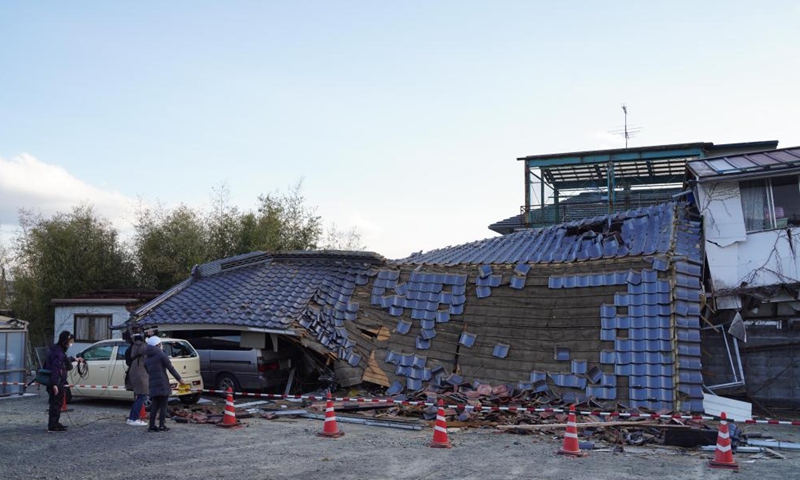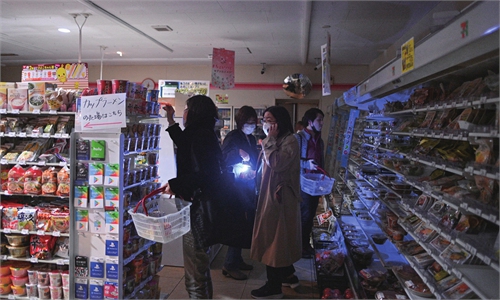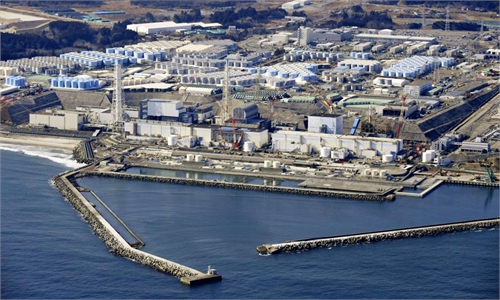Experts fear Japan may accelerate plan to dump Fukushima wastewater after earthquake

Photo taken on March 17, 2022 shows a damaged house after an earthquake at Kunimi-machi, Fukushima Prefecture, Japan. A 7.3-magnitude earthquake hit northeastern Japan on late Wednesday night. (Xinhua/Zhang Xiaoyu)
A magnitude 7.4 earthquake rattled northeastern Japan late Wednesday night, including Miyagi and Fukushima prefectures, which was devastated by a 9.0 quake in 2011 that triggered the Fukushima nuclear disaster. Some Chinese citizens in Japan and analysts expressed deep concern over the safety of the nuclear facilities and worry that Japan may accelerate its plan to discharge contaminated water into the sea.
At least four died and over 160 were injured in the earthquake, and according to Japanese media, many people found it impossible to remain standing. The jolts were strong enough to toss people through the air.
No casualties of Chinese nationals have been reported so far. Chinese Foreign Ministry on Thursday expresses condolences to the victims of the earquake
The powerful earthquakes reminded many Chinese people in Japan of the nightmare of the magnitude 9.0 quake and tsunami in 2011 that caused multiple nuclear reactor meltdowns. As of Thursday, local Chinese told the Global Times that their lives were not much affected but they worry about the safety of the nuclear facilities in Fukushima.
Wang Ling, deputy head of the Fukushima Overseas Chinese Federation, told the Global Times on Thursday that she was sorting out some files when the quake struck late night. The tremor was strong and lasted long. It was "very similar" to the deadly quake 11 year ago, and "very scary," she said.
Their lives have not been affected much other than the electricity and water supply being cut off in the Fukushima region, and classes were canceled. But what she worried about the most was the safety of nuclear facilities in the region, Wang said.
Chinese experts are also concerned about how the earthquake may affect Japan's decision to discharge Fukushima nuclear wastewater.
Chang Yen-chiang, director of the Yellow Sea and Bohai Sea Research Institute of Dalian Maritime University, who has been closely following the Japanese government's decision on discharging Fukushima wastewater, told the Global Times on Thursday that he was more worried about whether the latest earthquakes will make Japan accelerate its plan to release the contaminated water into the sea, as earthquakes would increase the risk of storage tank leaks.
The tanks for storing radioactive contaminated water, which were mostly built underground, might leak after an earthquake, Chang said, noting that he and other researchers observed the leak of Fukushima tanks previously.
Since 2013, the Fukushima storage tanks were found to leak several times. Most recently in January, the operator of Japan's crippled Fukushima nuclear power plant found that a coolant solution, used to create an ice wall halting the seepage of groundwater into reactor buildings, leaked from two storage tanks, Reuters reported.
Kyodo News reported in May 2021 that the storage tank leak in 2021 was caused by earthquakes and aging storage facilities.
The operator of the Fukushima plant said in December 2021 that it intended to build an underwater tunnel to release the contaminated water into the sea, and Chang said Japan may immediately start releasing water once it finishes building the tunnel to avoid dealing with further leaks, and the release may be earlier than spring 2023, its previous plan.
What's more, some minor cracks at Fukushima nuclear power plant caused by the earthquake 11 years ago may further grow after these earthquakes and leak radioactive water, Chang said. He said Japan should have a thorough examination of its plants to ensure that all facilities run safely.
However, Japan's nuclear regulator said on Thursday that data showed no abnormalities with the reactors and facilities at the Fukushima Daiichi nuclear power plant, though a fire alarm went off in the turbine building of the No. 5 reactor, the Kyodo News reported on Thursday.
Chang doubted Japan's response, as sometimes the information released by the Japanese government was inconsistent with what Chang and other Chinese researchers have observed, and he said the nuclear radiation index Japan released was often lower than what they have observed.
Chang also called on the Japanese government to release a comparison of radioactive water data before and after the earthquake, and invite researchers from surrounding countries and the International Atomic Energy Agency (IAEA) to conduct a field inspection on the effect of this earthquake and whether Japan may speed up releasing the water into the sea.
As to whether Japan's latest earthquake and its possible aftershocks might affect China, the Tsunami Advisory Center of China's Ministry of National Resources said on Thursday that the earthquake may trigger tsunamis around the epicenter based on preliminary quake data, but will not affect China's coast.



